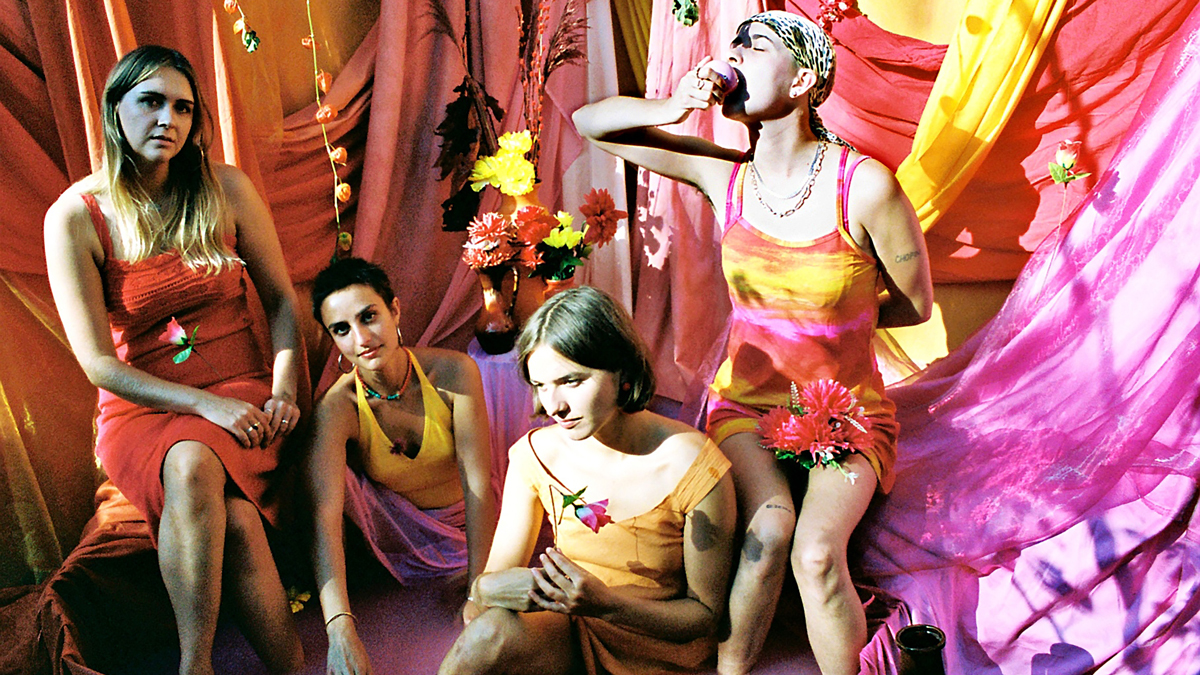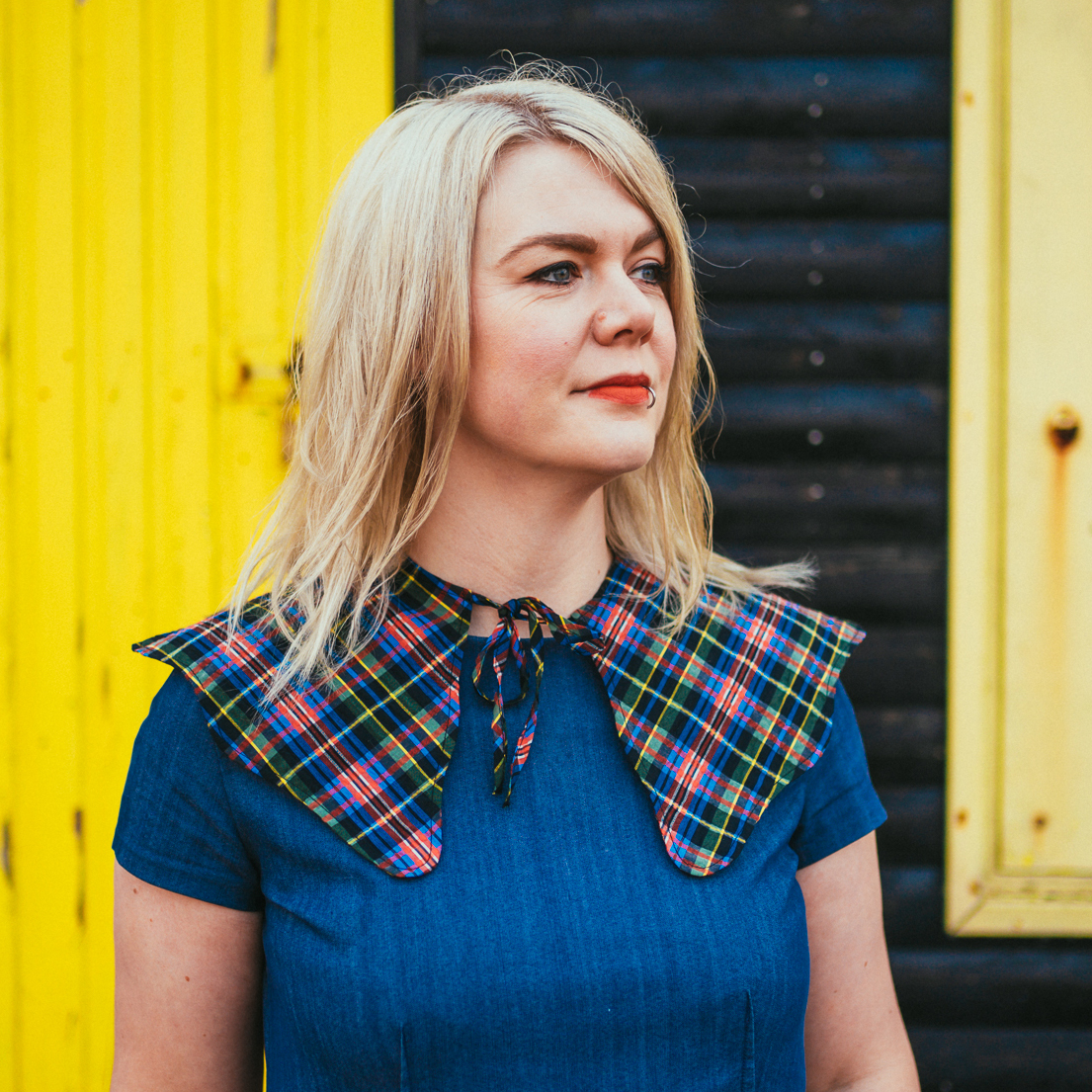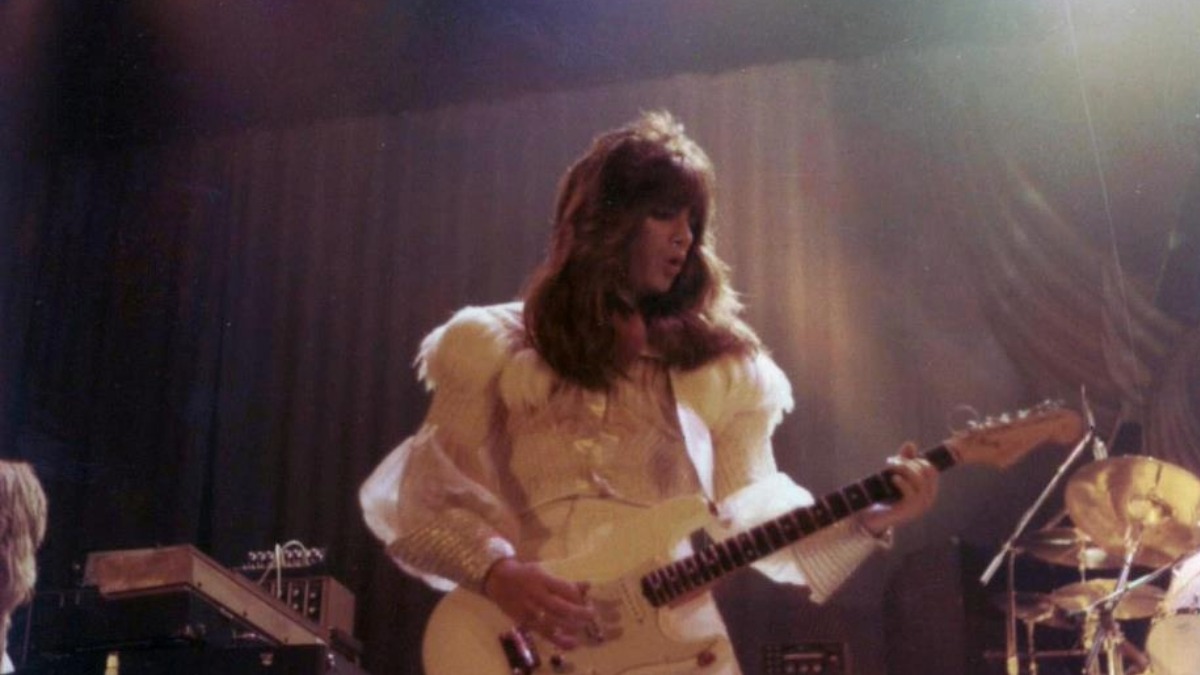Goat Girl: "We're all drawn to gray sonics that don't quite sound right"
Lottie Pendlebury and Ellie Rose Davies on their love of discordance, channeling doom metal and how a broken air conditioner inspired some surprising new chord progressions

All the latest guitar news, interviews, lessons, reviews, deals and more, direct to your inbox!
You are now subscribed
Your newsletter sign-up was successful
On the same day that South London’s Goat Girl signed with Rough Trade Records in 2018, another deal was being made behind closed doors. And so, just as their debut might’ve been set against the backdrop of Brexit, the band’s sophomore lands in the middle of a global pandemic.
But while the rest of the world might’ve fallen into political chaos during the last three years, Goat Girl has evolved from the dogged punk tenacity of their debut into a sprawling four-headed hydra.
On All Fours ushers in a maturing perspective on both material – global warming, censorship, and mental health all get a nod – but also in form and freedom.
Joined by new bassist Holly Mullineaux, longstanding drummer Rosy Jones, and guitarists Lottie Pendlebury and Ellie Rose Davies take a more collaborative approach to songwriting, switching between instruments and lead vocal roles.
On a chilly afternoon tucked up in their best sweats, Lottie and Ellie talk digital sounds, discordance, and doom-metal recording spaces with Dan Carey.
You’ve said before how your sound has been on quite a journey and that certainly shines through in the new record. What are the biggest differences to you between ‘On All Fours’ and your debut?
Lottie: "This record wasn't just coming from me bringing a song and then having parts already there for everyone to play. It was more like someone had an initial idea, but that could completely change because we were all working on it together, and trying to get to a point where four people can agree is quite tricky. There's a long process involved with that way of working. But the outcome is an expression of all of our personalities."
All the latest guitar news, interviews, lessons, reviews, deals and more, direct to your inbox!
One key change within the songwriting of On All Fours is that you switch up roles between the band. How was it letting go of your primary instruments? Are you trained in another?
Lottie: "None of us are really trained in anything. We're all self-taught musicians. With the first album, it was very lo-fi, interesting rhythmically and melodically at the same time, reminiscent of people like Viv Albertine and Ana da Silva from The Raincoats. People who have found their own sound, but are not necessarily trained in their craft."
Ellie: "I've never been classically trained in guitar. I feel like I'm most familiar with it just because I've been playing it for so long, so being on a different instrument was exciting, but also nerve-wracking as well. The keyboard was actually my first instrument, but I gave it up because I didn't want to do grades, so guitar became my rebellion."
There is such a blissful balance between analogue and digital sounds within On All Fours. Was that something you were thinking about when writing the songs?
Lottie: "With each song, we wanted to get a real soundscape. In The Crack, for example, we'd listened to Ellie's demo and it was really dark. It had this heavy, monotonous beat and it was quite electronic so we were thinking about how to capture that sound but in a band made up of guitars. It became about how to create this dirgy sound in the recording process.
"Dan and I experimented around with three different amps. Everyone had to leave the room because we were just doing this heavy doom metal session."
You mention recording with Dan Carey (black midi, Fontaines D.C., and Kae Tempest) again at his Streatham studio. What gear were you using on this record?
Ellie: "I recorded on Dan Carey’s 1966 Mustang. It was in a house fire back in the day and got a bit burnt, which Dan thinks made it better."
Lottie: "Dan had my Fender Telecaster plugged into that pedal that Sunn O))) made with EarthQuake [the Life Pedal]. It's fucking heavy. We would have an idea about a song and how we want to capture that energy and then Dan had the tools to be able to do that in a way that is quite analog as well. You're doing it all live – you're not adding it in afterward in Logic."
Ellie: "Dan really gets both mine and Lottie's style of guitar playing because I always lean towards warmer sounds that aren't too abrasive.
"Tonally, I'm quite influenced by jazz and soul. I like the softness of jazz chords and that juxtaposition with Lottie's quite scratchy, more harsh tones go so well together. Dan really understands that and how to capture it and what amps and pedals to steer us towards that we're going to love. This time around, I was going through a Lazy J Model 20 combo."
Lottie: "Normally I use a tube amp for that natural fuzz. The pedals I use kind of accentuate that sound more. For the really crazy stuff, I don't even know what was happening. It was all a bit of a blur!"

Lottie, when you were writing Pest From The West, you talked about finding four chords that really resonated and how you transposed them onto different strings to give a sustained 7th feel. Why move the chord shapes along the fretboard – how does that aid the songwriting process?
Lottie: "The way that I wrote for this album was originating from the synth which is an instrument I'm not too familiar with, so when I play a chord, I'm working by ear; I'm not working by knowledge, hearing what melodies and notes sound good together. Whether that be discordant or a progression that makes you feel a certain way.
"Then I would find these chords that I was happy with and transfer them onto the guitar. I'd be figuring out how to play them on separate strings with these notes that ended up being really far apart so I'd end up playing with this weird claw shape."
Ellie: "What you do on The Crack is really far apart."
Lottie: "Yeah, it's always really stressful going back to the verse from the chorus because it's a chord that just has so much strain on my hand to get into that position."
Ellie, in Jazz (In the Supermarket), you mentioned you stumbled upon the guitar chords by mistake. What kind of sounds were you exploring on the guitar?
Ellie: "With that particular song, we were all just going mad in the studio. It was really hot and the air con had broken. My hands were sweaty so I was sliding to the wrong shape, which is how I found those chords.
"We're all kind of drawn to gray sonics that don't quite sound right. We like the discordant thing. It's interesting to consider: what is musical and what is discordant? It's quite a fine line but it's always interesting to explore."
- On All Fours is out via Rough Trade Records on 30 January.
Cheri Amour is a writer, editor and broadcaster intent on amplifying the voices of women and non-binary artists in print, online and on air. During her twenties, she played lead guitar in a touring two-piece, sharing the stage with The Slits and John Peel-approved punks The Nightingales. Formerly Deputy Editor at TGA Magazine, Cheri headed up its Tech section pouring over pedals with everyone to indie icon Debbie Smith (Echobelly/Curve) to multi-instrumentalist Katie Harkin (Sleater Kinney/Waxahatchee/Wye Oak). She's currently working on an upcoming 33 1/3 book on the unassuming influence of South Bronx sister troupe ESG, out in Spring 2023.

